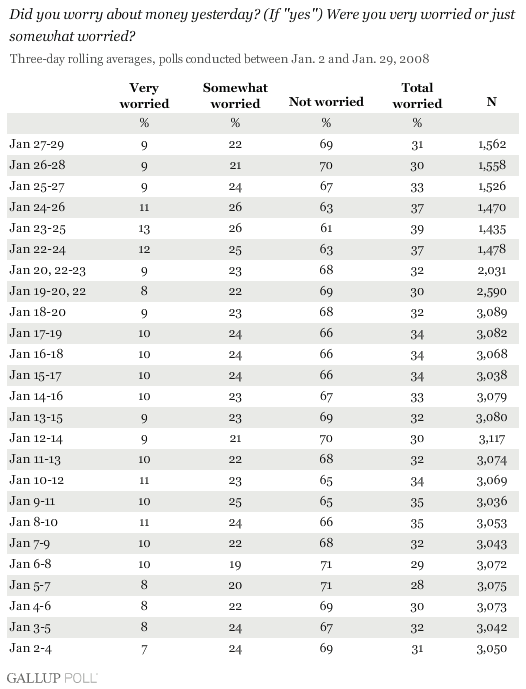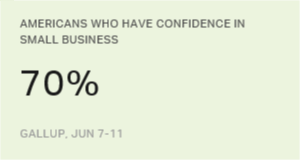PRINCETON, NJ -- Following the Martin Luther King holiday weekend, the Federal Open Market Committee (FOMC) took "emergency action" in reducing interest rates by Âľ of a point. This was a historic rate cut in terms of both its size and its timing, because it took place between the regular FOMC meetings. This was followed by the announcement that President Bush and Congress had reached a preliminary agreement on an immediate fiscal stimulus plan.
While these emergency actions had their intended effect of helping to stabilize the financial markets, it was a lot less clear whether they helped or hurt overall consumer psychology. Did they reassure consumers that policy-makers would act to prevent a severe recession or did they simply confirm consumer fears of an economic downturn? Results of Â鶹´«Ă˝AV's continuous consumer polling during January provide some unprecedented insights into the impact on consumer psychology of these emergency actions.
Worried About Money Spikes
Â鶹´«Ă˝AV polling conducted Jan. 18-20, 2008 -- just prior to the Jan. 22 emergency rate cut -- shows 32% of Americans saying they worried about money "yesterday," with 9% saying they were very worried and 23% saying they were somewhat worried. This is consistent with Â鶹´«Ă˝AV's new daily tracking polls showing that the percentage of consumers worried about money ranged between 28% and 35% during the first three weeks of January.
If the Fed's emergency rate cut and the announcement of a new fiscal stimulus plan had a confidence-building impact on consumer psychology, one would expect consumer worries about money to ease, with the percentage of worried consumers declining below the low point of the earlier range (28%) or at least stabilizing. In fact, exactly the opposite happened, as the percentage of consumers worried about money surged to a new high of 39% over the key post-Fed-action days of Jan. 23-25. A detailed look at the data shows this increase in consumer worries took place across all age and income groups.
This spike in consumer worries about spending money, however, was short-lived. By the end of the month, the percentage of worried consumers had fallen back to levels similar to those before the Fed's emergency action, with 31% of consumers saying they were worried about money from Jan. 27-29.

The Fed Shouldn't Need to Take "Emergency Action"
Over the past several decades, consumers and investors worldwide have built a great deal of trust in the Federal Reserve Board, believing the Fed to be a firm steward of the U.S. economy through the numerous economic challenges the country faces. And even when the U.S. economy is buffeted by such shocks as 9/11 or Hurricane Katrina, monetary authorities have been seen as taking appropriate actions immediately.
In a behavioral economic sense, everyone seemed to believe that the Fed -- even with its relatively inexperienced leadership in a monetary policy context -- would routinely make the correct decisions at its regular FOMC meetings. From this perspective, the widespread reporting of the Fed's emergency actions to stabilize the financial markets, the governmental decision to provide an immediate fiscal stimulus, and the widespread press interpretation of these events as reflecting an even more troubled U.S. economy than anyone realized seem to have shaken the conventional wisdom that the Fed deserves to be trusted.
Normally, this spike in consumer worries resulting from this break in the conventional wisdom about the Fed would remain hidden from public view; the usual monthly polling of consumer perceptions would hide this effect because the results are averaged across the month. However, Â鶹´«Ă˝AV's new daily polling has revealed something important: When the Fed takes emergency action because it failed to anticipate economic trends -- in contrast to when it is responding to an unexpected economic shock -- this tends to shake consumer and investor trust on a global basis.
On Wednesday, the Commerce Department reported that the U.S. economy grew only 0.6% during the fourth quarter of 2007. On Thursday, the Commerce Department reported that consumer spending was at its lowest level in six months in December while the Labor Department reported that unemployment claims surged in late January. The financial markets responded with predictions of additional Fed rate cuts, with some possibly taking place before the next FOMC meeting in March.
Â鶹´«Ă˝AV's data suggest that as monetary authorities consider responding to the new economic data and the financial markets' emotions, they should also consider the behavioral economics of further shattering global trust in their stewardship of the U.S. economy. Sometimes "emergency action" can do more harm than good.
Survey Methods
Results are based on 3,089 telephone interviews with national adults, aged 18 and older, conducted Jan. 18-20, 2008. For results based on this sample, one can say with 95% confidence that the maximum margin of sampling error is ±2 percentage points.
Other results are based on 1,435 interviews conducted Jan. 23-25, 2008, and 1,562 interviews conducted Jan. 27-29, 2008. For results based on these samples, the maximum margin of sampling error is ±3 percentage points.
In addition to sampling error, question wording and practical difficulties in conducting surveys can introduce error or bias into the findings of public opinion polls.
